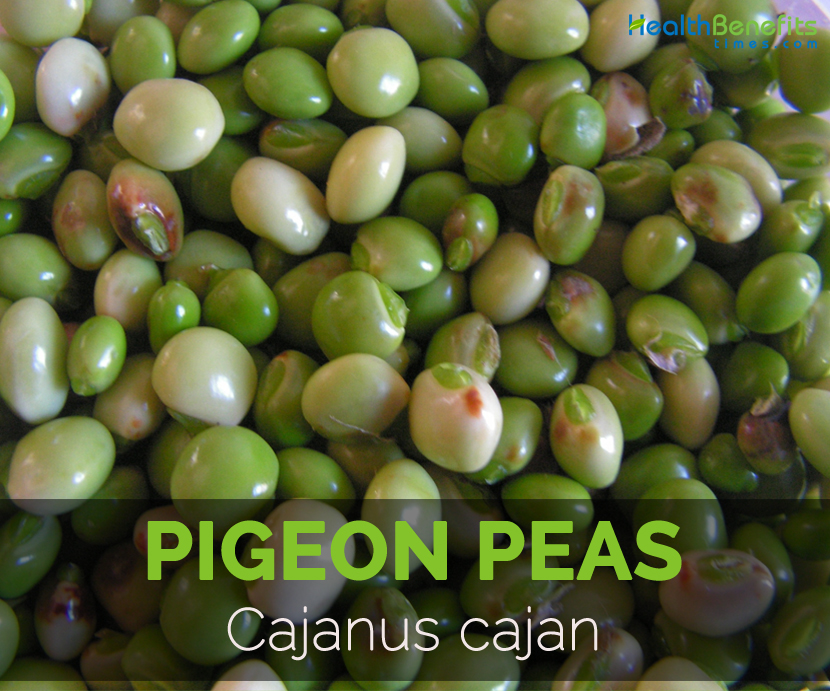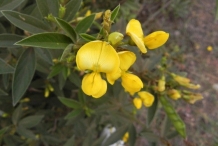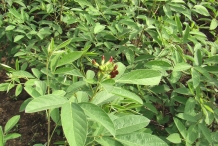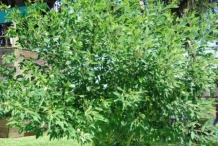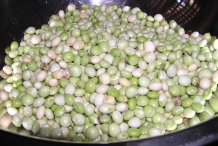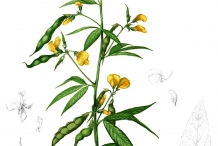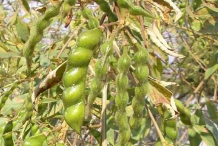History
It was domesticated in India 3,500 years ago. The seeds are used as grains in Africa, Asia and Latin America. It was grown for thousands of years in India. Around 2,000 BC, pigeon pea was developed in East Africa which was then brought to the America. Today pigeon pea is grown widely throughout the world in tropical and subtropical regions.
Plant
It is an erect, glandular-pubescent, short-lived and perennial shrub. The plant grows up to 1–2 m high with tetrarch taproots. The erect and ribbed stem is 15 cm in diameter. Leaves are trifoliate, alternate in dark green color above and silvery underneath. The plant yields yellow to red flowers which is 1.2 cm – 1.7 cm in diameter that turns into fruit as seed pods. The pods are linear-oblong, green or red, 2–13 cm long and 0.5–1.7 cm wide. Each pod contains about nine seeds which is subglobose – ellipsoid or squarish in shape having 5 mm as a diameter. The seeds are white, cream, brown, purplish to black in color.
Nutritional Value
The serving size of one cup which measures 153 grams provides 43 mg of Vitamin C, 0.536 mg of Vitamin B1, 153 µg of Vitamin B9, 2.4 mg of iron, 0.69 mg of manganese, 181 mg of phosphorus, 29.82 gram of Carbohydrate, 3.294 mg of Vitamin B3 and others. The pigeon peas are rich in proteins, minerals, vitamins and lipids.
Health Benefits of Pigeon peas
Pigeon peas are an excellent source of magnesium, phosphorus, calcium and potassium. Besides, it contains fewer amounts of copper, zinc and magnesium. It provides an adequate amount of iron and selenium. The flattened shape pods hold a substantial place among pulses in India. The seeds vary in shape, size and color. It is round or oval in white, brown, red, greyish or purplish with a white hylum. Few well-known advantages of Pigeon Peas are listed below:
- Maintains blood pressure
Potassium is the key mineral which is found in pigeon peas that acts as a vasodilator, reduces the blood constriction and also reduces blood pressure. Those who suffer from hypertensionor should add pigeon peas to the daily diet because they are highly prone to the cardiovascular disease. (1)
- Assist in growth
Pigeon peas are also loaded with high protein content which is required for the growth and development. It is essential for the formation of cells, tissues, muscles and bones. It also assists in the healing process and cell regeneration in the body. One cup of cooked pigeon peas possesses 11 grams of protein. (2)
- Prevent anemia
Folate is found in adequate amount in pigeon peas which helps to prevent anemia and neural tube defects in unborn which is caused due to the deficiency of folate. The intake of single cup of pigeon peas provides about 110% of the daily recommended vitamins. (3)
- Anti-inflammatory properties
The seeds, leaves and peas of pigeon peas are used to treat inflammation due to the presence of organic compounds. The mashed pigeon peas paste is used as a treatment for piles which is known as hemorrhoids. (4)
- Helps in losing weight
Pigeon peas possess low amount of calories, cholesterol and saturated fats which makes it healthy. The presence of dietary fiber keeps full for a long period of time, increase metabolism rate and reduces the possibilities of weight gain. The nutrients found in pigeon peas converts into the usable energy than to store as a fat. (5)
- Boost energy
Vitamin B is also present in pigeon peas. Riboflavin and Niacin enhance the carbohydrate metabolism, prevent in fat storage and boost energy levels. It is suitable for the people living in arid climates, physical work that reduces the energy quickly. (6)
- Aids immunity
To maintain the nutrients, raw is better because 25% of nutrients are lost when cooked. The uncooked peas help to enhance the immune system. Vitamin C promotes the white blood cells production and acts as an antioxidant that promotes in overall wellness as well as strong immunity. (7)
- Healthy heart
Pigeon peas contain dietary fiber, potassium and low cholesterol which help to maintain the healthy heart. Potassium lowers the strain on heart by reducing the blood pressure. Dietary fiber maintains cholesterol balance and prevents atherosclerosis. (8)
- Digestive health
Pigeon peas are rich in dietary fiber which is essential for maintaining the digestive health. Fiber adds bulk to the stool and enhances the bowel movements by reducing the strain as well as inflammation. It reduces the constipation, cramping, bloating and diarrhea. Fiber enhances the efficiency of nutrient absorption.
Traditional uses
- In Ayurveda, it is used as volerant that heals wounds and sores.
- It is also used as an astringent that is used to stop bleeding.
- It is also used to cure lungs and chest disease.
- It is used to eliminate the internal parasitic worms.
- In Nigeria, the leaves are used to treat.
- In Panamanian folk medicine, it is used as a treatment for diabetes.
- It helps to cure jaundice, cough and bronchitis.
- In Malay traditional medicine, leaves decoction helps to treat coughs, abdominal troubles and diarrhea.
- The juice extracted from leaves is helpful for earache and sores.
- In Java, the pulped leaves are used as a treatment for herpes, sores and itches.
- In China, the roots are used as a sedative, expectorant, anthelmintic and vulnerary.
- The roots are used to treat throat inflammation, diarrhea and chlorosis.
- A poultice is used to lessen swellings.
- In Philippines, a decoction made from leaves is useful for diarrhea, cough and abdominal pains.
How to Eat
- In India, pigeon pea is used as dhal.
- In other parts of Asia, seeds are used to make tempeh or tofu.
- In Africa, dried seeds are used in sauces to accompany rice, cassava and yam.
- The immature seeds and pods are consumed fresh or added in soups as vegetables.
- In Central America, seeds of pigeon pea are canned and frozen.
- The seeds are used as flour dried peas and green vegetable peas.
- In India, the seeds are used as pulses whereas the young pods are used in sambhar.
- The fresh pods, young shoots and seeds are used as vegetables in sayor, spicy soups and other side-dishes in Southeast Asia and the Pacific.
- The young pods and leaves are added to various dishes in Indonesia and Ethiopia.
- The ripened seeds are consumed by roasting.
- The green pigeon pea with rice is considered as the main traditional food of Puerto Rican.
Comments
| Pigeon peas Quick Facts | |
|---|---|
| Name: | Pigeon peas |
| Scientific Name: | Cajanus cajan |
| Origin | Domesticated in India 3,500 years ago. |
| Colors | White, cream, brown, purplish to black (Seeds) |
| Shapes | Subglobose - ellipsoid or squarish; Diameter: 5 mm (Seeds) |
| Calories | 170 Kcal./cup |
| Major nutrients | Vitamin C (47.78%) Vitamin B1 (44.67%) Vitamin B9 (38.25%) Iron (30.00%) Manganese (30.00%) |
| Health benefits | Boost energy, Aids immunity, Healthy heart, Digestive health, Prevent anemia |
| More facts about Pigeon peas | |
| Rank | Scientific Name & (Common Name) |
|---|---|
| Kingdom | Plantae (Plants) |
| Subkingdom | Tracheobionta (Vascular plants) |
| Superdivision | Spermatophyta (Seed plants) |
| Division | Magnoliophyta (Flowering plants) |
| Class | Magnoliopsida (Dicotyledons) |
| Subclass | Rosidae |
| Order | Fabales |
| Family | Fabaceae/Leguminosae (Pea family) |
| Genus | Cajanus Adans. (Cajanus) |
| Species | Cajanus cajan (L.) Millsp. (Pigeonpea) |
| Synonyms |
|


